Second Thoughts for the Day – 13 May – Monday of the Fourth Week of Easter, C and the Memorial of Blessed Julian of Norwich (c 1342-c 1430)
Excerpt from Pope Benedict’s Catechesis on Julian of Norwich
Wednesday, 1st December 2010
Dear Brothers and Sisters,
I still remember with great joy the Apostolic Journey I made in the United Kingdom last September. England is a land that has given birth to a great many distinguished figures who enhanced Church history with their testimony and their teaching. One of them, venerated both in the Catholic Church and in the Anglican Communion, is the mystic Julian of Norwich, of whom I wish to speak this morning.
The — very scant — information on her life in our possession comes mainly from her Revelations of Divine Love in Sixteen Showings, the book in which this kindly and devout woman set down the content of her visions.
It is known that she lived from 1342 until about 1430, turbulent years both for the Church, torn by the schism that followed the Pope’s return to Rome from Avignon and for the life of the people who were suffering the consequences of a long drawn-out war between the Kingdoms of England and of France. God, however, even in periods of tribulation, does not cease to inspire figures such as Julian of Norwich, to recall people to peace, love and joy.
As Julian herself recounts, in May 1373, most likely on the 13th of that month, she was suddenly stricken with a very serious illness that in three days seemed to be carrying her to the grave. After the priest, who hastened to her bedside, had shown her the Crucified One not only did Julian rapidly recover her health but she received the 16 revelations that she subsequently wrote down and commented on in her book, Revelations of Divine Love.
And it was the Lord himself, 15 years after these extraordinary events, who revealed to her the meaning of those visions.
“‘Would you learn to see clearly your Lord’s meaning in this thing? Learn it well – Love was His meaning. Who showed it to you? Love…. Why did He show it to you? For Love’…. Thus I was taught that Love was our Lord’s meaning” (Julian of Norwich, Revelations of Divine Love, Chapter 86).
Inspired by divine love, Julian made a radical decision. Like an ancient anchoress, she decided to live in a cell located near the church called after St Julian, in the city of Norwich — in her time an important urban centre not far from London. She may have taken the name of Julian, precisely from that Saint, to whom was dedicated the church, in whose vicinity she lived for so many years, until her death.
This decision to live as a “recluse”, the term in her day, might surprise or even perplex us. But she was not the only one to make such a choice. In those centuries a considerable number of women opted for this form of life, adopting rules specially drawn up, for them, such as the rule compiled by St Aelred of Rievaulx (1110-1167).
The anchoresses or “recluses”, in their cells, devoted themselves to prayer, meditation and study. In this way they developed a highly refined human and religious sensitivity which earned them the veneration of the people. Men and women of every age and condition, in need of advice and comfort, would devoutly seek them. It was not, therefore, an individualistic choice, precisely with this closeness to the Lord, Julian developed the ability to be a counsellor to a great many people and to help those who were going through difficulties in this life.
We also know that Julian too received frequent visitors, as is attested by the autobiography of another fervent Christian of her time, Margery Kempe, who went to Norwich in 1413 to receive advice on her spiritual life. This is why, in her lifetime, Julian was called “Dame Julian”, as is engraved on the funeral monument that contains her remains. She had become a mother to many.
Men and women who withdraw to live in God’s company acquire by making this decision a great sense of compassion for the suffering and weakness of others. As friends of God, they have at their disposal a wisdom that the world — from which they have distanced themselves — does not possess and they amiably share it with those who knock at their door.
It was precisely in the solitude infused with God that Julian of Norwich wrote her Revelations of Divine Love. Two versions have come down to us, one that is shorter, probably the older and one that is longer. This book contains a message of optimism based on the certainty of being loved by God and of being protected by his Providence.
In this book we read the following wonderful words: “And I saw full surely that ere God made us He loved us, which love was never lacking nor ever shall be. And in this love He has made all His works and in this love He has made all things profitable to us and in this love our life is everlasting… in which love we have our beginning. And all this shall we see in God, without end” (Revelations of Divine Love, Chapter 86).
The theme of divine love recurs frequently in the visions of Julian of Norwich who, with a certain daring, did not hesitate to compare them also to motherly love. This is one of the most characteristic messages of her mystical theology. The tenderness, concern and gentleness of God’s kindness to us are so great that they remind us, pilgrims on earth, of a mother’s love for her children. In fact, the biblical prophets also sometimes used this language that calls to mind the tenderness, intensity and totality of God’s love, which is manifested in creation and in the whole history of salvation that is crowned by the Incarnation of the Son.
God, however, always excels all human love, as the Prophet Isaiah says: “Can a woman forget her sucking child, that she should have no compassion on the son of her womb? Even these may forget, yet I will never forget you” (Is 49:15).
Julian of Norwich understood the central message for spiritual life – God is love and it is only if one opens oneself to this love, totally and with total trust and lets it become one’s sole guide in life, that all things are transfigured, true peace and true joy found and one is able to radiate it.
I would like to emphasise another point. The Catechism of the Catholic Church cites the words of Julian of Norwich when it explains the viewpoint of the Catholic faith on an argument that never ceases to be a provocation to all believers (cf. nn. 304-313, 314).
If God is supremely good and wise, why do evil and the suffering of innocents exist? And the Saints themselves asked this very question. Illumined by faith, they give an answer that opens our hearts to trust and hope: in the mysterious designs of Providence, God can draw a greater good even from evil, as Julian of Norwich wrote: “Here I was taught by the grace of God that I should steadfastly hold me in the Faith … and that … I should take my stand on and earnestly believe in … that ‘all manner of thing shall be well”’ (The Revelations of Divine Love, Chapter 32).
Yes, dear brothers and sisters, God’s promises are ever greater than our expectations. If we are present to God, to His immense love, the purest and deepest desires of our heart, we shall never be disappointed. “And all will be well”, “all manner of things shall be well” – this is the final message that Julian of Norwich transmits to us and that I am also proposing to you today. Many thanks…Vatican.va





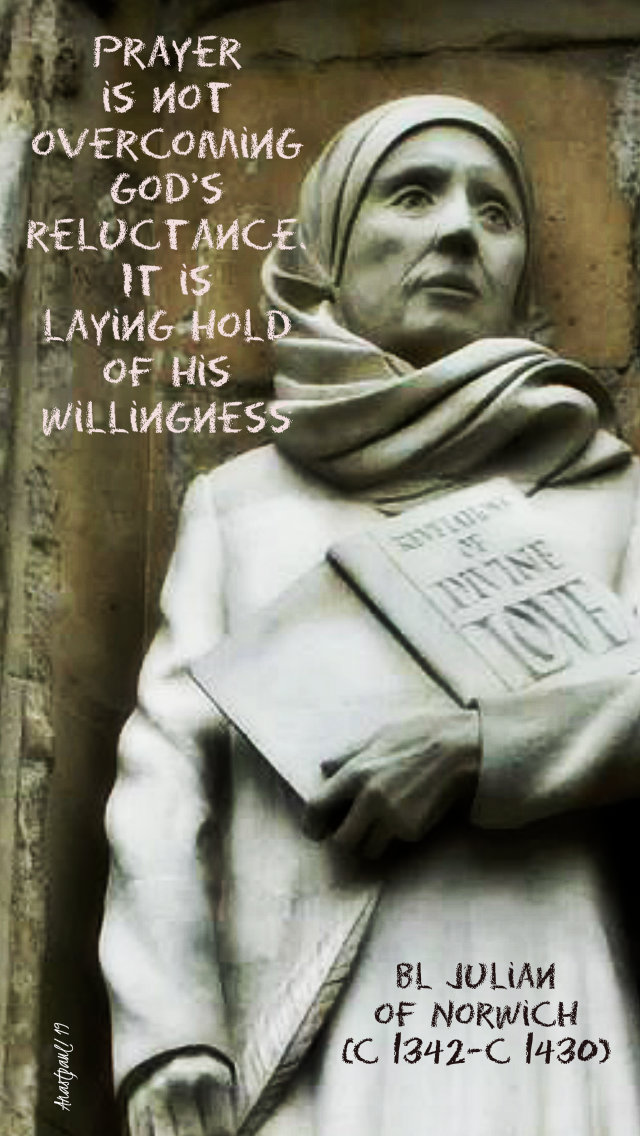


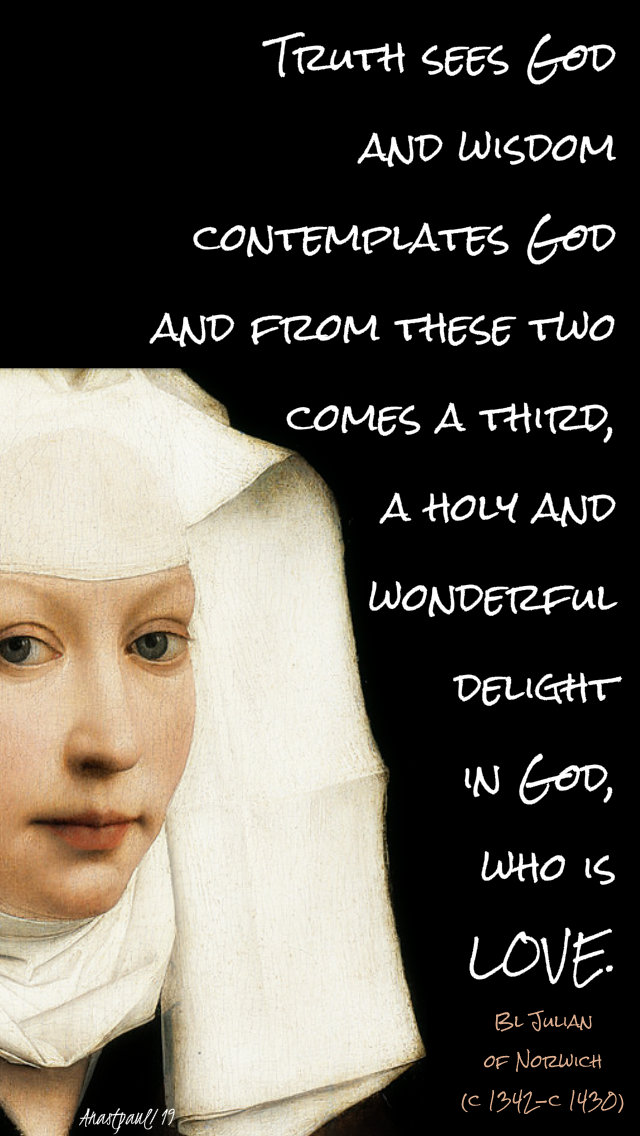

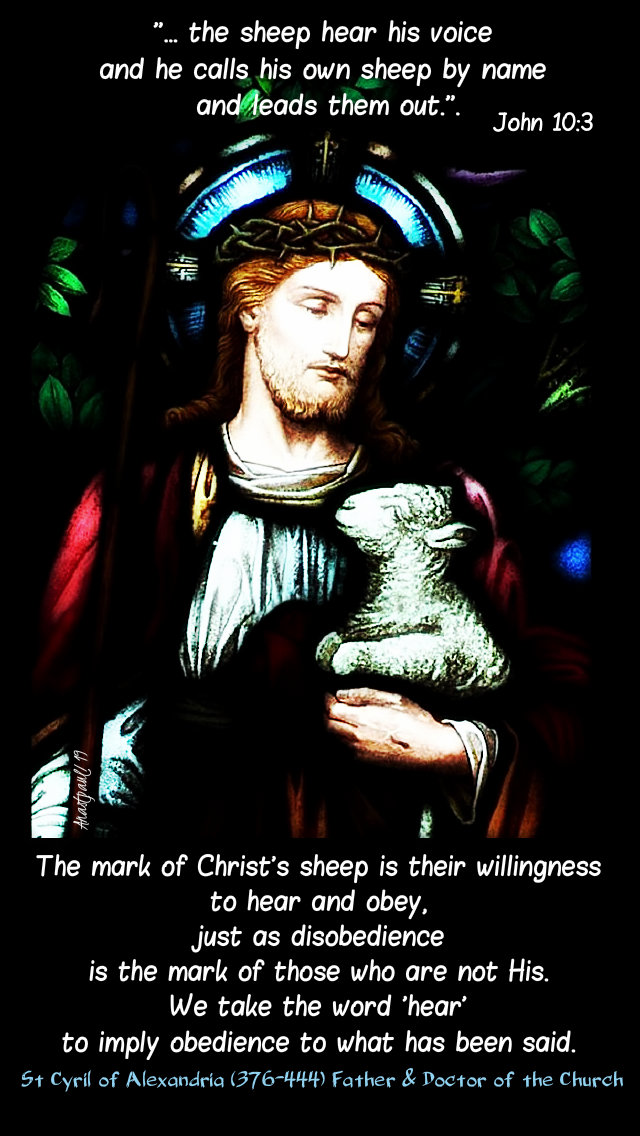

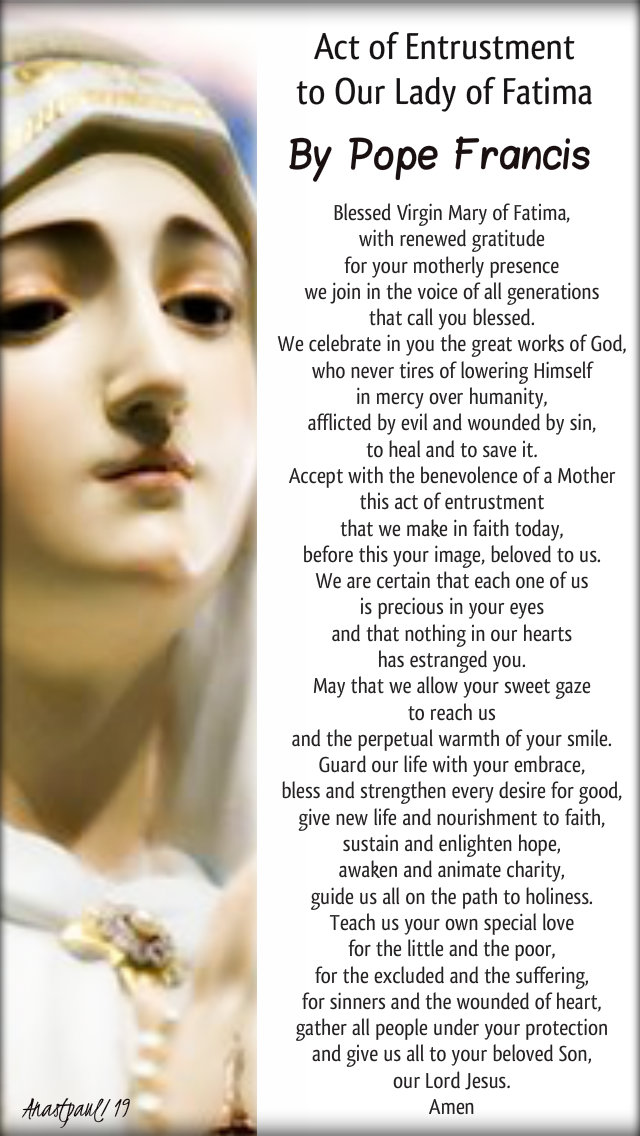
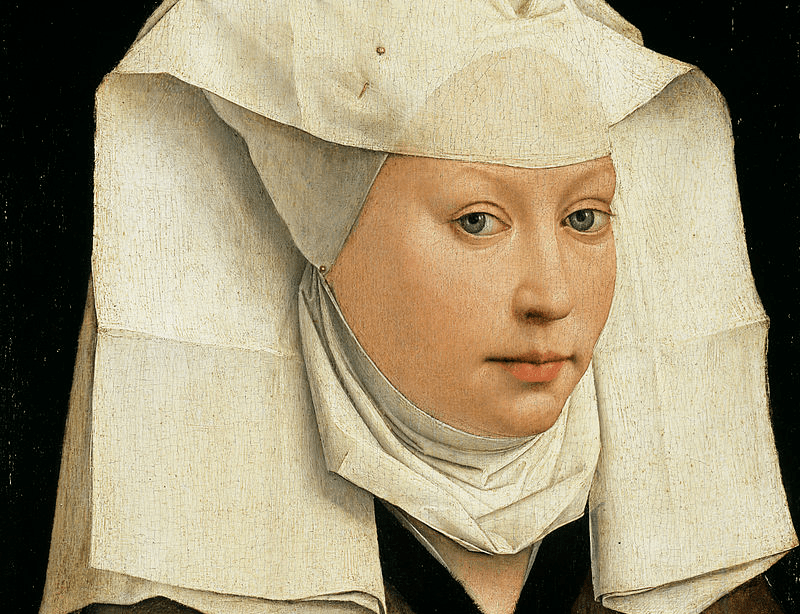
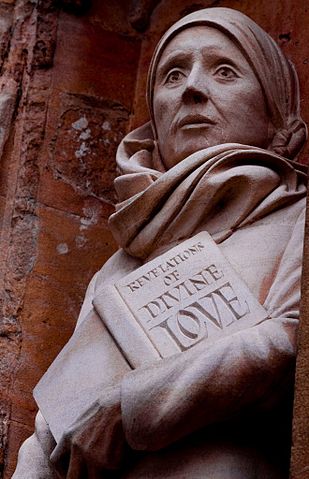 When she was 30 Julian suffered from a severe illness. Whilst apparently on her deathbed, Julian had a series of intense visions of Jesus Christ, which ended by the time she recovered from her illness on 13 May 1373. Julian wrote about her visions immediately after they had happened (although the text may not have been finished for some years), entitled Revelations of Divine Love. Twenty to thirty years later, perhaps in the early 1390s, Julian began to write a theological exploration of the meaning of the visions, known as The Long Text. This work seems to have gone through many revisions before it was finished, perhaps in the first or even second decade of the fifteenth century. Until her death in about 1416, Julian stayed in her simple room. Like most anchorites, she prayed, fasted, did penance, studied, sewed clothing for the poor and advised the village people.
When she was 30 Julian suffered from a severe illness. Whilst apparently on her deathbed, Julian had a series of intense visions of Jesus Christ, which ended by the time she recovered from her illness on 13 May 1373. Julian wrote about her visions immediately after they had happened (although the text may not have been finished for some years), entitled Revelations of Divine Love. Twenty to thirty years later, perhaps in the early 1390s, Julian began to write a theological exploration of the meaning of the visions, known as The Long Text. This work seems to have gone through many revisions before it was finished, perhaps in the first or even second decade of the fifteenth century. Until her death in about 1416, Julian stayed in her simple room. Like most anchorites, she prayed, fasted, did penance, studied, sewed clothing for the poor and advised the village people.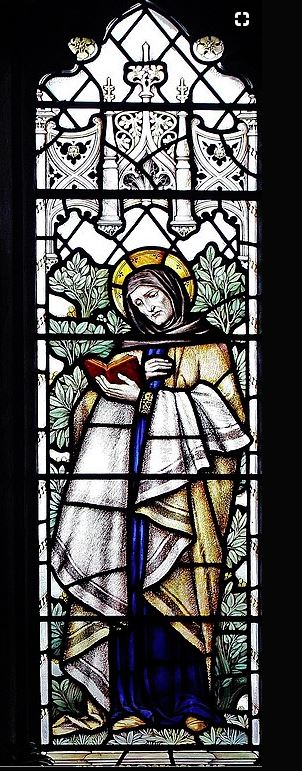 Revelations is a celebrated work in Catholicism because of the clarity and depth of Julian’s visions of God. Julian of Norwich is now recognised as one of England’s most important mystics.
Revelations is a celebrated work in Catholicism because of the clarity and depth of Julian’s visions of God. Julian of Norwich is now recognised as one of England’s most important mystics.
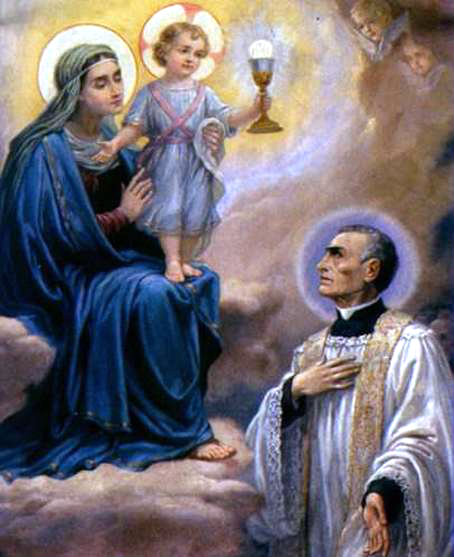 The title of Our Lady of the Blessed Sacrament was first given to Mary by St Peter Julian Eymard in May 1868, while speaking to his novices. A few years later he described what her statue should look like: “The Blessed Virgin holds the Infant in her arms and He holds a chalice in one hand and a Host in the other.” He exhorted them to invoke Mary: “Our Lady of the Blessed Sacrament, pray for us who have recourse to thee!”
The title of Our Lady of the Blessed Sacrament was first given to Mary by St Peter Julian Eymard in May 1868, while speaking to his novices. A few years later he described what her statue should look like: “The Blessed Virgin holds the Infant in her arms and He holds a chalice in one hand and a Host in the other.” He exhorted them to invoke Mary: “Our Lady of the Blessed Sacrament, pray for us who have recourse to thee!”
You must be logged in to post a comment.